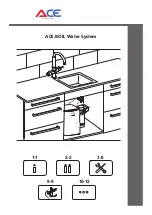
Functions
5.5 Real-time communication
PROFINET with STEP 7
Function Manual, 05/2021, A5E03444486-AL
193
Fields of application of PROFINET with IRT
PROFINET with IRT is particularly suitable for:
•
Considerable deterministics with large quantity structures concerning the I/O user data
communication (productive data)
•
Considerable performance also with many devices concerning the I/O user data
communication (productive data)
•
Parallel transfer of productive and TCP/IP data via a cable, even with considerable data
traffic whilst ensuring the forwarding of productive data by reserving the transmission
bandwidth.
International standard IEC 61158
The communication procedures RT and IRT are standardized in the international standard
IEC 61158.
5.5.2
RT
PROFINET IO with real-time communication (RT) is the ideal solution for integrating IO
systems. This is a solution that also uses standard Ethernet in the devices and commercially
available industrial switches as infrastructure components. A special hardware support is not
required.
If you want to use PROFINET functions that provide an additional value, such as topology
detection, diagnostics, device exchange without exchangeable medium/PG, you have to use
switches that support the PROFINET standard according to the IEC 61158 standard. In the
integrated switches of PROFINET devices and PROFINET switches (e.g., the SCALANCE product
family), PROFINET functions in accordance with the PROFINET standard are implemented and
can be used without restriction for integration in the PROFINET IO system (see also section
Active network components (Page 1).
Real-time communication (RT)
PROFINET IO frames have priority over standard frames in accordance with IEEE802.1Q. This
ensures the required determinism in the automation technology. The data is transferred via
prioritized Ethernet frames. With RT, you can achieve update times
≥
250
μ
s with RT.
Switching mechanisms
Switches in SIMATIC meet the real-time requirements with two mechanisms on PROFINET:
"Store and forward" and "Cut through".
Store and forward
In the Store and forward method, the switch stores the frames completely and places them in
a queue. If the switch supports the international standard IEEE 802.1Q, then the data is
sorted according to its priority in the queue. The frames are then forwarded selectively to the
specific port that can access the addressed node (Store and forward).
Summary of Contents for SIMATIC ET 200AL
Page 2: ......
Page 143: ......
Page 218: ......
Page 250: ......
Page 296: ......
Page 337: ......
Page 365: ......
Page 392: ......
Page 419: ......
Page 451: ......
Page 483: ......
Page 597: ......
Page 648: ......
Page 702: ......
Page 739: ......
Page 781: ......
Page 804: ......
Page 828: ......
Page 853: ......
Page 880: ......
Page 906: ......
Page 996: ...Diagnostics ...
Page 1121: ......
Page 1565: ......
















































